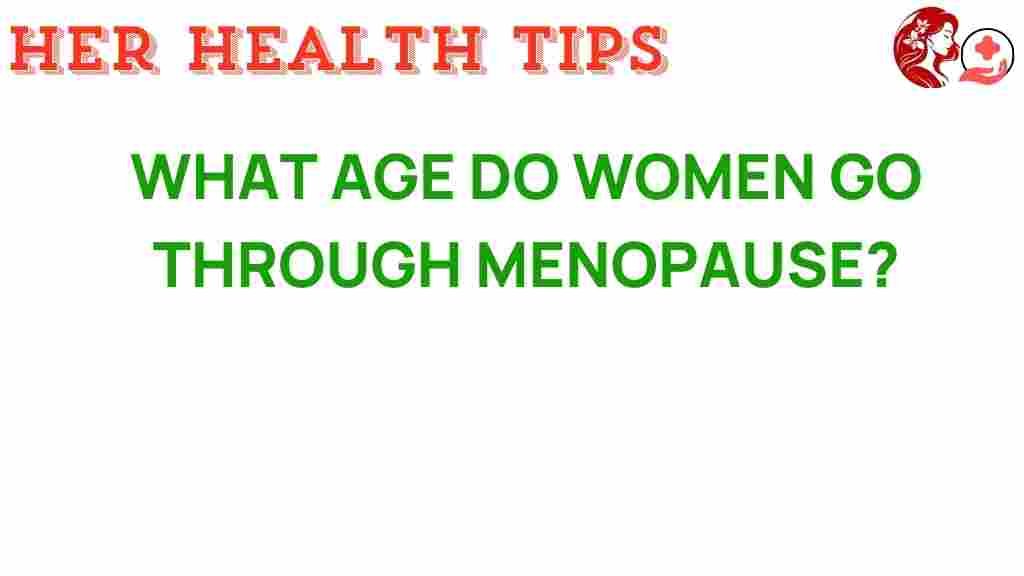Unlocking the Mystery: When Do Women Experience Menopause?
Menopause is a significant milestone in a woman’s reproductive health, marking the end of her menstrual cycles and fertility. Understanding when menopause occurs, its symptoms, and how it affects women’s health is crucial for navigating this life stage. In this article, we will explore the age of onset for menopause, the hormonal changes involved, and how women can manage their health awareness during this transformative period. Join us as we unlock the mystery behind menopause and empower women to embrace midlife with confidence.
Understanding Menopause
Menopause is defined as the point in time when a woman has gone 12 consecutive months without a menstrual period. It typically occurs between the ages of 45 and 55, but the age of onset can vary widely among women. The average age for menopause in the United States is around 51 years old.
The Stages of Menopause
Menopause is not a single event but a process that involves several stages:
- Perimenopause: This is the transition phase leading up to menopause, typically starting in a woman’s 40s, but can begin earlier. During this time, hormonal changes can cause irregular periods and various symptoms.
- Menopause: The official diagnosis of menopause occurs after a woman has missed her period for 12 consecutive months.
- Postmenopause: This stage follows menopause and lasts for the rest of a woman’s life. Hormonal levels stabilize, but women may continue to experience some symptoms.
Hormonal Changes During Menopause
The hormonal changes during menopause are primarily due to the decline in estrogen and progesterone production from the ovaries. These changes can lead to various symptoms and impact overall women’s health significantly. Understanding these hormonal shifts can help women prepare for and manage the changes they may experience.
Common Symptoms of Menopause
As women transition through menopause, they may experience a range of symptoms, including:
- Hot flashes: Sudden feelings of heat, often accompanied by sweating and flushing.
- Night sweats: Hot flashes that occur during sleep, leading to discomfort and disrupted sleep.
- Irregular periods: Changes in menstrual cycle patterns, including skipped periods or heavier bleeding.
- Vaginal dryness: Decreased lubrication may lead to discomfort during intercourse.
- Mood swings: Emotional fluctuations and increased irritability due to hormonal changes.
- Sleep disturbances: Difficulty falling or staying asleep, often linked to night sweats.
- Memory lapses: Some women report difficulty concentrating or forgetfulness during this phase.
Factors Influencing the Age of Onset of Menopause
The age of onset for menopause can be influenced by various factors, such as:
- Genetics: Family history can play a significant role; if your mother or sister experienced early menopause, you might too.
- Health conditions: Conditions like autoimmune disorders or diabetes can affect hormonal balance.
- Smoking: Women who smoke may experience menopause earlier than non-smokers.
- Certain medical treatments: Surgical procedures like hysterectomy or chemotherapy can induce menopause.
Steps to Manage Menopause Symptoms
Managing menopause symptoms is essential for maintaining quality of life. Here are some strategies that can help:
1. Lifestyle Modifications
Making healthy lifestyle choices can alleviate some menopause symptoms:
- Regular Exercise: Engaging in physical activity can help manage weight, improve mood, and reduce hot flashes.
- Balanced Diet: A diet rich in fruits, vegetables, whole grains, and lean proteins can support overall health.
- Adequate Hydration: Staying hydrated helps with hot flashes and can improve skin elasticity.
2. Hormone Replacement Therapy (HRT)
Hormone replacement therapy can be an effective treatment for severe menopause symptoms. HRT involves taking medications that contain female hormones to replace the ones the body no longer makes. It can help manage:
- Hot flashes
- Vaginal dryness
- Mood swings
Before starting HRT, it’s essential to discuss the risks and benefits with a healthcare provider.
3. Alternative Therapies
Some women find relief through alternative therapies, such as:
- Herbal supplements: Black cohosh and evening primrose oil are popular choices, but always consult a healthcare provider before use.
- Acupuncture: Some studies suggest acupuncture may help relieve hot flashes.
- Mindfulness and Stress Reduction: Techniques such as yoga, meditation, and deep breathing can help manage stress and improve overall well-being.
Health Awareness and Education
Health awareness during menopause is crucial. Women should educate themselves about the changes occurring in their bodies and seek support. Here are some steps to increase health awareness:
- Consult Healthcare Providers: Regular check-ups can help monitor health and manage symptoms effectively.
- Join Support Groups: Connecting with other women going through similar experiences can provide emotional support and valuable information.
- Stay Informed: Reading articles, attending workshops, and exploring reputable online resources can enhance understanding of menopause.
Common Misconceptions About Menopause
Several myths surround menopause that can lead to confusion and concern. Here are a few misconceptions debunked:
- Menopause happens suddenly: Many believe menopause occurs overnight, but it is a gradual process.
- All women experience severe symptoms: Symptoms vary greatly; some women may have mild symptoms, while others may struggle.
- Menopause means the end of sexual desire: While some women experience changes in libido, many continue to have fulfilling sexual lives.
Conclusion
Understanding menopause is essential for women’s health, particularly as they navigate the challenges of midlife. By recognizing the age of onset, hormonal changes, and symptoms associated with menopause, women can take proactive steps to manage their health during this important life stage. Embracing health awareness and seeking support can empower women to approach menopause with confidence and resilience.
For more information on women’s health and menopause, consider visiting this resource for comprehensive guidance and support.
Remember, menopause is a natural process, and with the right knowledge and resources, women can thrive during this transformative period. Embrace the journey of menopause and prioritize your health!
This article is in the category Reproductive and created by HerHealthTips Team

1 thought on “Unlocking the Mystery: When Do Women Experience Menopause?”